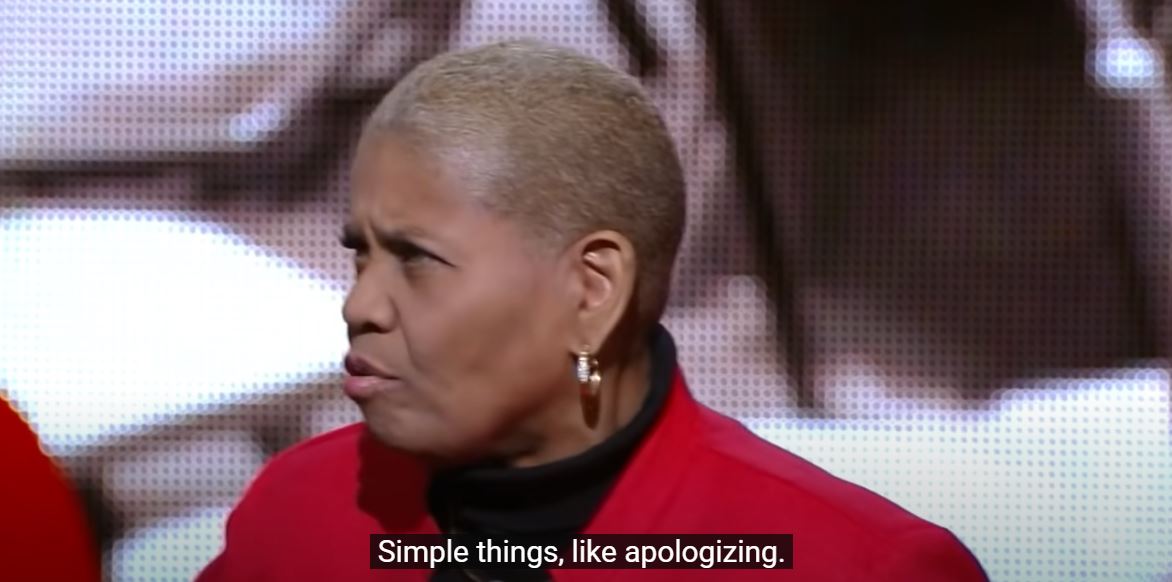Published - Mon, 24 Jul 2023

Rita Pierson: Every kid needs a champion (TED in May 2013)
Rita Pierson: Every kid needs a champion
I have spent my entire life
either at the schoolhouse, on the way to the schoolhouse, or talking about what
happens in the schoolhouse. Both my parents were educators, my maternal
grandparents were educators, and for the past 40 years I've done the same
thing. And so, needless to say, over those years I've had a chance to look at
education reform from a lot of perspectives. Some of those reforms have been
good. Some of them have been not so good. And we know why kids drop out. We
know why kids don't learn. It's either poverty, low attendance, negative peer
influences. We know why. But one of the things that we never discuss or we
rarely discuss is the value and importance of human connection, relationships.
James Comer says that no significant learning can occur without a significant
relationship. George Washington Carver says all learning is understanding
relationships. Everyone in this room has been affected by a teacher or an
adult. For years, I have watched people teach. I have looked at the best and
I've look at some of the worst.
A colleague said to me one time,
"They don't pay me to like the kids. They pay me to teach a lesson. The
kids should learn it. I should teach it. They should learn it. Case
closed." Well, I said to her, "You know, kids don't learn from people
they don't like." (Laughter) (Applause) She said, "That's just a
bunch of hooey." And I said to her, "Well, your year is going to be
long and arduous, dear." Needless to say it was. Some people think that
you can either have it in you to build a relationship or you don't. I think
Stephen Covey had the right idea. He said you ought to just throw in a few
simple things, like seeking first to understand as opposed to being understood,
simple things like apologizing. You ever thought about that? Tell a kid you're
sorry, they're in shock. I taught a lesson once on ratios. I'm not real good
with math, but I was working on it. And I got back and looked at that teacher
edition. I'd taught the whole lesson wrong. (Laughter) So I came back to class
the next day, and I said, "Look, guys, I need to apologize. I taught the
whole lesson wrong. I'm so sorry." They said, "That's okay, Ms.
Pierson. You were so excited, we just let you go." (Laughter) (Applause) I
have had classes that were so low, so academically deficient that I cried. I
wondered, how am I going to take this group in nine months from where they are
to where they need to be? And it was difficult. It was awfully hard. How do I
raise the self-esteem of a child and his academic achievement at the same time?
One year I came up with a bright idea. I told all my students, "You were
chosen to be in my class because I am the best teacher and you are the best
students, they put us all together so we could show everybody else how to do
it." One of the students said, "Really?" (Laughter) I said,
"Really. We have to show the other classes how to do it, so when we walk
down the hall, people will notice us, so you can't make noise. You just have to
strut." And I gave them a saying to say: "I am somebody. I was
somebody when I came. I'll be a better somebody when I leave. I am powerful,
and I am strong. I deserve the education that I get here. I have things to do,
people to impress, and places to go." And they said, "Yeah!" You
say it long enough, it starts to be a part of you. And so — (Applause)
I gave a quiz, 20 questions. A student missed
18. I put a "+2" on his paper and a big smiley face. He said,
"Ms. Pierson, is this an F?" I said, "Yes." He said,
"Then why'd you put a smiley face?" I said, "Because you're on a
roll. You got two right. You didn't miss them all." I said, "And when
we review this, won't you do better?" He said, "Yes, ma'am, I can do
better." You see, "-18" sucks all the life out of you.
"+2" said, "I ain't all bad." (Laughter) (Applause) For
years I watched my mother take the time at recess to review, go on home visits
in the afternoon, buy combs and brushes and peanut butter and crackers to put
in her desk drawer for kids that needed to eat, and a washcloth and some soap
for the kids who didn't smell so good. See, it's hard to teach kids who stink.
And kids can be cruel. And so she kept those things in her desk, and years
later, after she retired, I watched some of those same kids come through and
say to her, "You know, Ms. Walker, you made a difference in my life. You
made it work for me. You made me feel like I was somebody, when I knew, at the
bottom, I wasn't. And I want you to just see what I've become."
And when my mama died two years
ago at 92, there were so many former students at her funeral, it brought tears
to my eyes, not because she was gone, but because she left a legacy of
relationships that could never disappear. Can we stand to have more
relationships? Absolutely. Will you like all your children? Of course not. And
you know your toughest kids are never absent.
(Laughter) Never.
You won't like them all, and the tough ones
show up for a reason. It's the connection. It's the relationships.
And while you won't like them all, the key is, they can never, ever know it. So
teachers become great actors and great actresses, and we come to work when we
don't feel like it, and we're listening to policy that doesn't make sense, and
we teach anyway. We teach anyway, because that's what we do. Teaching and
learning should bring joy. How powerful would our world be if we had kids who
were not afraid to take risks, who were not afraid to think, and who had a
champion
Every child deserves a champion,
an adult who will never give up on them, who understands the power of
connection, and insists that they become the best that they can possibly be. Is
this job tough? You betcha. Oh God, you betcha. But it is not impossible. We
can do this. We're educators. We're born to make a difference.
Thank you so much.
Created by
Comments (6)



1.to make a good relationship with our students
2.to make a positive connection to them.
3.to take everything is possible,
4.more motivation and practice to our learners make the best.
5.we must aspect the changes of new thing and engage it with happy
6.we should have confidence with what we do.
thank you Dr Msangi for sharing.


"Very impressive... I really agree with Rita Pierson. She opened up our minds on building a good relationship with our students and encouraging them so that victory is ahead of them. Let us work together to apply this to math teaching and learning. I hope we can transform from the wrong perception that math is a difficult subject."

Search
Popular categories
INTERACTIVE TEACHING METHODS
17COLLEGE BASED PD MODELS
3MORO MATH CENTRES
3ZANA ZA KUFUNDISHIA HESABU
1Latest blogs

MAJADALA WA MADA YA KUANDAA SHUGHULI ZA UFUNDISHAJI
Tue, 21 May 2024

MAJADILIANO KUHUSU MAADA YA MIFANO YA MBINU SHIRIKISHI
Sat, 18 May 2024

MAJADILIANO KUHUSU MAADA YA MIFANO YA MBINU SHIRIKISHI
Sat, 18 May 2024

Write a public review